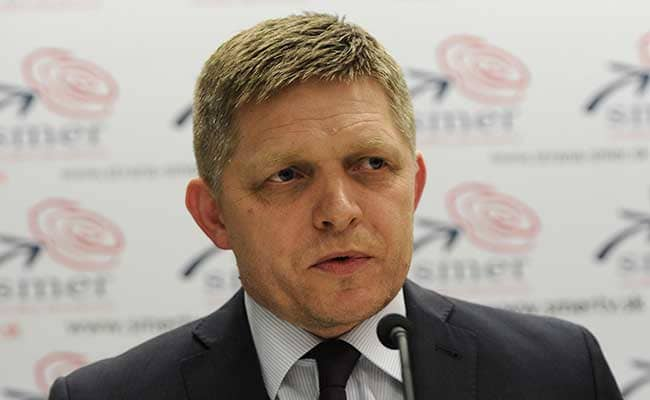Former PM Robert Fico Opposed To Ukraine Aid Wins Slovak Elections


People in Slovakia have bigger problems than (dealing with) Ukraine, Robert Fico said (File)
Bratislava:
A Slovak populist party that wants to stop military aid to Ukraine and is critical of the EU and NATO will be tasked with forming a new government after winning elections.
The Smer-SD party led by former prime minister Robert Fico scored 23 percent in Saturday’s vote, beating the centrist Progressive Slovakia at 18 percent.
“Slovakia and the people in Slovakia have bigger problems than (dealing with) Ukraine,” Fico told reporters on Sunday.
He added Ukraine was “a huge tragedy for all” and called for peace talks as “further killing will not help anyone”.
During the campaign, the 59-year-old vowed that Slovakia would not send “a single round of ammunition” to Ukraine and called for better ties with Russia.
President Zuzana Caputova, a former member of Progressive Slovakia and a longtime political rival of Fico, said she would task him with forming a new government.
“In the spirit of our constitutional tradition, tomorrow I will entrust the formation of the government to the winner of the election,” she said in a statement.
Analysts have said a Fico government could radically change Slovakia’s foreign policy to resemble that of Hungarian Prime Minister Viktor Orban.
But Fico, a leftist former lawyer, said Sunday that Slovakia’s foreign policy focus would not change as “we are naturally EU members”.
“That of course doesn’t mean I can’t criticise things in the EU that I don’t like.”
Hungary is seen as a troublemaker in the EU, frequently criticised by Brussels for rule-of-law issues and hampering EU and NATO efforts to help Ukraine.
“In Robert Fico, Orban will get a new ally,” analyst Tomas Koziak from the Czech University of Political Sciences told AFP.
Orban himself congratulated Fico on X, formerly Twitter, “on his undisputable victory at the Slovak parliamentary elections”.
“Always good to work together with a patriot. Looking forward to it!” Orban wrote.
‘People are fed up’
Many ordinary Slovaks are less concerned about foreign policy and hope the new government will focus on the economy and squabble less than the last one.
Selling bread rolls in a Bratislava bakery, Jana Urbanova told AFP she expected the government to tackle “unbearable” inflation.
“Fico is experienced, he is a professional, isn’t he? I did not vote for him but I don’t think it matters that he won,” she said.
Tomas Hrivnak, 23, said he had voted for Progressive Slovakia and was “disappointed” but added that the result was “not the end of the world”.
“I think people are fed up with the former government of centrist and right-wing politicians, their quarrels and inability to run this country properly,” he said.
But another Progressive Slovakia voter, Eva Lichnerova, voiced concern.
“The biggest threat that I see is the diversion from the European Union, the shift towards Russia, the suppression of journalists’ rights and freedoms,” she said.
Ukraine aid
Smer has won 42 seats in the 150-member parliament and needs coalition partners for a majority.
Hlas-SD, which emerged in 2020 as a breakaway party from Smer, is a potential partner with 27 seats.
Its chairman Peter Pellegrini became premier in 2018 after Fico’s resignation amid nationwide protests following the murder of journalist Jan Kuciak and his fiancee, Martina Kusnirova.
Kuciak uncovered links between the Italian mafia and Fico’s government in his last article, published posthumously.
The two parties could team up with the nationalist Slovak National Party (SNS), which won 10 seats, for a parliamentary majority of 79 seats.
Fico has already ruled twice with the SNS, which is also opposed to military aid for Ukraine.
Slovakia is one of Europe’s biggest donors to Ukraine, relative to the size of its economy.
Surge in disinformation
Slovakia’s next parliament will also include the centrist OLaNO party of maverick former premier Igor Matovic, who got involved in a fistfight with a Smer member during the heated campaign.
The centrist Christian Democrats and the right-wing SaS also garnered enough votes to have seats in parliament.
The election campaign was tarnished by particularly high rates of online disinformation, often targeting Progressive Slovakia chairman Michal Simecka, a European Parliament vice-speaker.
Slovakia emerged as an independent country in 1993, following a peaceful split with the Czech Republic after Czechoslovakia shed four decades of totalitarian communist rule in 1989.
Although many Slovaks have experience with the Moscow-steered communist regime, analysts say many are vulnerable to pro-Kremlin disinformation.
Fico’s election campaign also featured rhetoric against the LGBTQ+ community and migrants, causing concern among non-governmental organisations.
(Except for the headline, this story has not been edited by NDTV staff and is published from a syndicated feed.)

